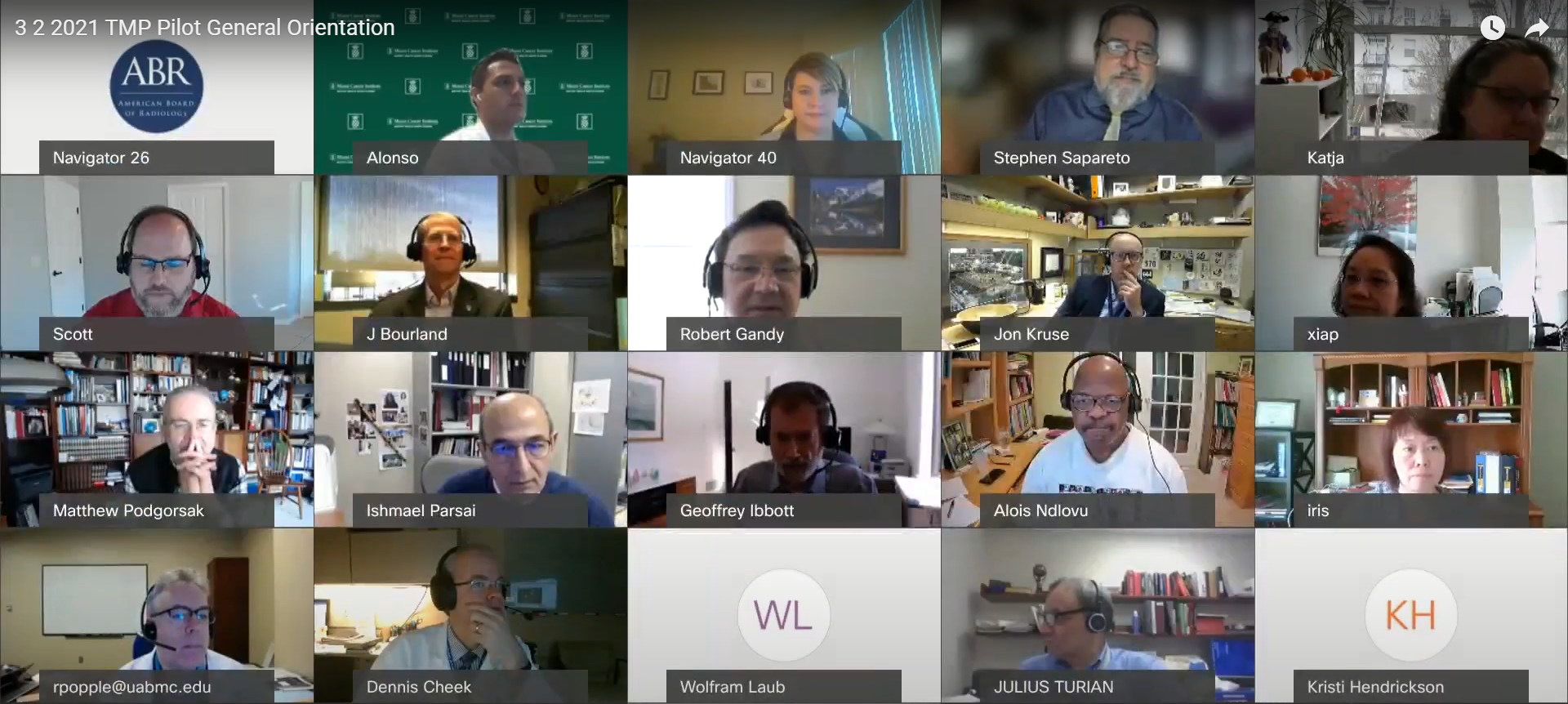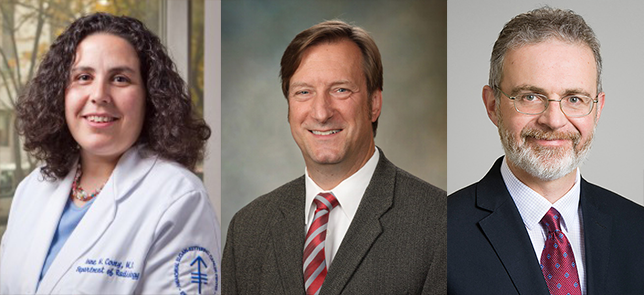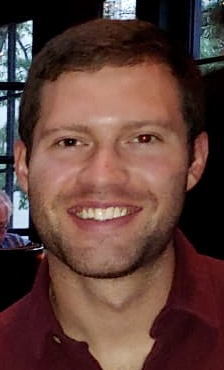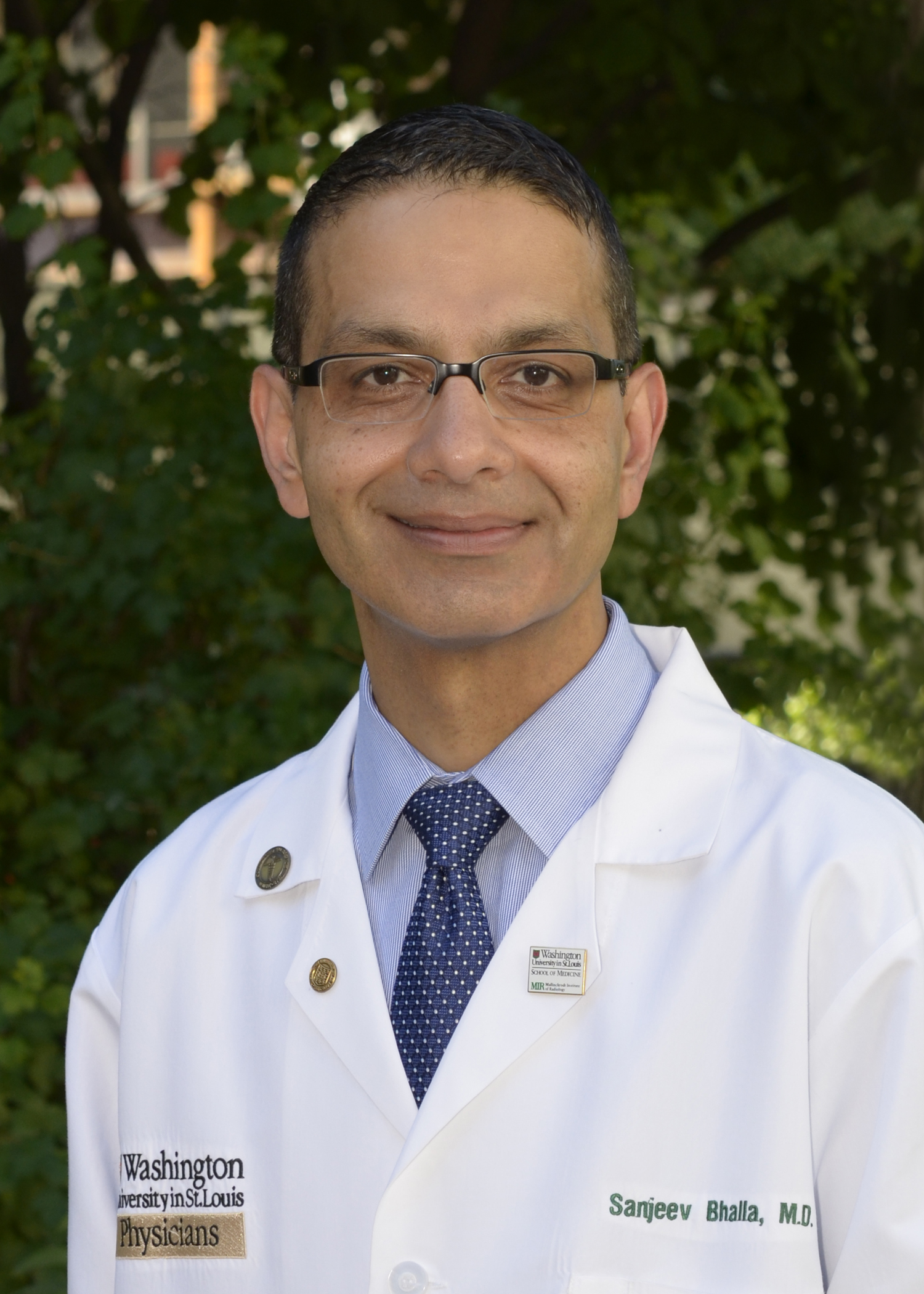April 2021 | Volume 14, Issue 2



ABR Succeeds in Transforming Exams During COVID

by J. Anthony Seibert, PhD, ABR Governor
2021;14(2):1
Welcome to this edition of The Beam, where we celebrate the beginning of spring and a sense of light at the end of the COVID-19 tunnel. It has been a year of transformation for the ABR, pivoting in short order from in-person to remote exams for all specialties and exams, including qualifying and certifying computer-based and oral exams, all since the middle of June 2020. The monumental effort undertaken by the ABR staff under difficult conditions of stay-at-home directives and the urgency of putting in place the infrastructure, software, and logistics to deliver safe, secure, and reliable remote exams for candidates beginning in January 2021 has been a great achievement. The Board of Governors (BOG) and Board of Trustees (BOT) are extremely grateful for the leadership of ABR Executive Director Brent Wagner and to the associate executive directors, senior staff directors, and all ABR employees for their diligence, teamwork, and ability to cope with significant stress over the last nine months – their accomplishments and dedication are truly amazing.
The BOG and BOT convened remotely during the first week of March for the spring ABR retreat to conduct business and carry on the mission of the ABR: “to certify that our diplomates demonstrate the requisite knowledge, skill, and understanding of their disciplines to the benefit of patients.” In this issue, a report from the BOG discusses three initiatives to support the mission on which they focused during those meetings: a communications survey, a look at possible fee reductions, and an effort to expand diversity, equity, and inclusion opportunities.
Click HERE to read more.

Continuous Improvements to MOC Create a More Meaningful Continuing Certification Program

by Vincent P. Mathews, MD, ABR President
2021;14(2):2
The ABR’s Continuing Certification/Maintenance of Certification (MOC) program was officially rolled out to diplomates with time-limited certificates in 2007. Shortly after the program was launched and almost continuously since, we have looked for ways to improve the value and meaningfulness of the process, while also looking for opportunities to mitigate stress and undue burden on participants. In our Continuing Certification program’s short history, we’ve made monumental improvements to better meet the needs of our diplomates. These program enhancements have been informed by stakeholder input and experience.
We have sought to make incremental changes to ensure that the daily clinical work of interventional radiologists, diagnostic radiologists, radiation oncologists, and medical physicists is applicable to many of the Continuing Certification requirements, especially Part 4 (Improvement in Medical Practice). We’ve examined and implemented ways for more of the numerous Continuing Medical Education (CME) opportunities offered by our radiology society partners to be used to fulfill Part 2 (Lifelong Learning and Self-Assessment) requirements.
Click HERE to read more.

Lessons Learned on Both Sides During First Remote Core Exam
 by Brent Wagner, MD, MBA, ABR Executive Director
by Brent Wagner, MD, MBA, ABR Executive Director
2021;14(2):3
In February, we delivered our first remote DR and IR/DR Qualifying (Core) Exam. Technically, the exam was a success. Although several individuals struggled with connection interruptions as a result of variable bandwidth, all were given enough time to complete the exam, and there was no evidence of significant security issues.
The informal feedback we received as we attempted to provide real-time help desk functions was encouraging – this was a group that lived up to expectations of professionals who, despite the inherent stress of a board exam, were both respectful of the process and patient with us as we worked to resolve individual problems as quickly as possible. We have plans to address the challenges, for candidates and for the board, in future exam administrations. Some of these can be accomplished for the computer-based exams this month, while others will be implemented later in 2021.
What we learned from the exam was not limited to the technical parts of the process. Data we collected on physics content within the exams prompted an examination (and subsequent revision) of the scoring model. Additionally, multiple responses to the survey revealed a lack of understanding of the rationale for content selection. Acknowledging that the responsibility to address any confusion rests with us, the following paragraphs attempt to provide clarity in this context.
Click HERE to read more.

ABR Board Makes Decisions About Survey, Fees, and DEI
by Brent Wagner, MD, MBA, ABR Executive Director
2021;14(2):4
The Board of Governors has held three remote meetings this year, including a three-day virtual retreat in early March. In fulfilling its fiduciary obligations, the Board guides the ABR through its focus on and execution of various initiatives that support the mission. Three of those initiatives are as follows:
Communications Survey
Recognizing the critical importance of communication and transparency in the development and maintenance of ABR programs, the Board strongly supported the recommendation of staff to perform a communications survey this year. The timing of this is challenging as the ABR refines and delivers a range of remote exams while continuing to enhance Continuing Certification/Maintenance of Certification (MOC), including Online Longitudinal Assessment (OLA). However, the April release of the American Board of Medical Specialties (ABMS) Draft Standards for Continuing Certification, a result of detailed analysis and discussion in follow-up to the 2019 report of the Recommendations of the Vision Initiative Commission, speaks to the need for the specialty boards to maintain focus on engaging stakeholders and enhancing value. The survey will be broad but also delve into elements of the certification process that relate to both the relevance and reasonableness of certification programs for candidates and diplomates.
Click HERE to read more.

Pilot Exams Demonstrate Strength of Remote Oral Exam Platform
 by Anne M. Covey, MD, Brian J. Davis, MD, PhD, and Matthew B. Podgorsak, PhD, ABR Trustees
by Anne M. Covey, MD, Brian J. Davis, MD, PhD, and Matthew B. Podgorsak, PhD, ABR Trustees
2021;14(2):5
ABR staff, with input from many volunteers, have been working since the summer of 2020 to develop remote oral exam software. To test the functionality of the platform, a “dry run” was performed in February with staff, trustees, and volunteers playing the roles of candidates and examiners. After a few adjustments, successful pilot exams were conducted last month involving 83 candidates seeking board certification in interventional radiology/diagnostic radiology (IR/DR), medical physics (MP), or radiation oncology (RO).
All candidates eligible to take a certifying oral exam were given the opportunity to volunteer for the pilot. From this pool, a limited number were selected by lottery: 33 for IR/DR, 28 for MP, and 22 for RO. There was no fee to participate and no risk to the candidates who volunteered. Pilot participants meeting all other certification requirements who passed the exam were issued certification. Those who did not pass are eligible to take the oral exam in May 2021 or a subsequent administration. The results of the pilot exam for candidates who failed will not be included in their ABR record.
Click HERE to read more.

Candidate Feedback on Core Exam Is Positive

by N. Reed Dunnick, MD, ABR Associate Executive Director for Diagnostic Radiology, and Brent Wagner, MD, MBA, ABR Executive Director
2021;14(2):6
We distribute an exit survey after each of our exams. For the DR and IR/DR Qualifying (Core) Exam in February, we were fortunate to see a 50% response rate from the nearly 1,400 candidates. We sincerely value the input, both the digital responses and the free-form comments, as we attempt to improve the experience and validity of our exams.
Some of the responses allowed us to determine trends in the local environment used by the candidates. For example, the group was nearly evenly split between laptop vs desktop, wired vs WiFi, and “in my home” vs “in my program.” (The way we collected the data was designed to be easy for the respondent, and correlations among the above variables were not established.)
Click HERE to read more.

Candidates Impressed by New Remote Exam Platform
2021;14(2):7
Ryan Adams, MD, Chief Diagnostic Radiology Resident, Vanderbilt University Medical Center
Dr. Adams, a graduate of Vanderbilt University Medical School, was in the first group of candidates who took the initial remote DR and IR/DR Core Exam in February. He will be completing an independent residency in interventional radiology at Massachusetts General Hospital, and his academic interests include medical technology, medical education, and quality improvement.
After the exam, he answered a few questions about how things went.
How much experience did you have with remote exams heading into the Core Exam?
In my medical school, all our exams were online using testing software installed on our personal computers, so I’ve taken dozens of remote exams.
What were you expecting going into the exam, since it was the first Core Exam the ABR has delivered remotely?
To be honest, I was expecting a very cumbersome check-in process where I would have to video chat with a proctor and show them my ID/exam room. I was fully prepared to have the exam software itself be a relic from the ’90s – block design, clunky, and slow. Most importantly, I was concerned we would not have adequate image manipulation tools, specifically window/level, brightness, color inversion, zoom, etc.
Click HERE to read more.
Experienced AEDs Fill Important Roles as Staff
by Rodney Campbell, ABR Communications Manager
2021;14(2):8
They have decades of combined experience in their fields. They have spent years as ABR volunteers, working on committees and as oral examiners. Now, they are part-time staff who serve as associate executive directors (AEDs), helping connect the ABR with its many stakeholders.
Paul Wallner, DO, is the AED with the most tenure, having held the position since May 2009. Reed Dunnick, MD, started in July 2019 while Geoffrey Ibbott, PhD, and James Spies, MD, began last April.
They are extensions of and answer to ABR Executive Director Brent Wagner, MD, MBA, and their many duties include:
- Supporting the boards of trustees and governors.
- Working with trustees and staff to implement category and committee exam development activities and volunteer development.
- Communicating and working with stakeholder organizations.
- Taking leadership roles in exam development and administration.
- Serving as a connection between the ABR and its candidates and diplomates.
All are long-time ABR volunteers and each brings specific talents to his job.
Click HERE to read more.

ABR Trustee Recognized as 2021 ARRS Distinguished Educator, Joins RSNA Board
The American Roentgen Ray Society (ARRS) has named ABR Trustee Sanjeev Bhalla, MD, as the 2021 ARRS Distinguished Educator. This award recognizes outstanding individuals in the field of medical imaging who have a proven record of improving radiological education and remain committed to creating and implementing new and innovative educational activities.
In addition, Dr. Bhalla recently joined the Board of Directors of the Radiological Society of North American (RSNA) as the Board Liaison for Education.
A professor of radiology at Mallinckrodt Institute of Radiology (MIR) at the Washington University School of Medicine in St. Louis, Dr. Bhalla was named MIR’s Radiology Residency Teacher of the Year in 2003, 2011, and 2017, and has received the Outstanding Teaching Award in radiology residency 16 times. In 2021, he was the recipient of Washington University School of Medicine’s Distinguished Clinician Award.
Click HERE to read more.

ABR 2020 Annual Report Coming Soon
2021;14(2):11
Last year was tumultuous as professionals from radiology and medical physics spent significant time on the front lines of battling the COVID-19 pandemic. We have collected stories from men and women in the field to share in our 2020 annual report, which will be available soon on our website. For a preview, please read the article written by Catheryn Yashar, MD, on our blog.

March 30 Blog
Stressed in Cincinnati: Addressing Interruptions in Children’s Hospital Reading Room
March 22 Blog
Blazing Trails and Breaking Barriers: Celebrating Women Innovators in Medicine and Radiology
March 20 Blog
ABR Looking for Feedback on Residency Service-Time Requirement
March 17 Blog
Future Residents Make Match Day Memories
March 15 Blog
Anxiety, Joy, Relief: Resident Matching Program Delivers Range of Emotions
March 10 Blog
Scam Alert: Diplomates Receiving Fake ABR Calls






